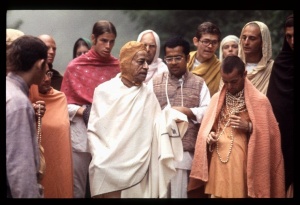SB 4.19.15: Difference between revisions
(Vanibot #0018 edit: make synonym terms in Sanskrit italic in SB - Vanisource) |
(Vanibot #0054 edit - transform synonyms into clickable links, which search similar occurrences) |
||
| Line 23: | Line 23: | ||
<div class="synonyms"> | <div class="synonyms"> | ||
''vadhāt'' | ''[//vanipedia.org/wiki/Special:VaniSearch?s=vadhāt&tab=syno_o&ds=1 vadhāt]'' — from killing; ''[//vanipedia.org/wiki/Special:VaniSearch?s=nivṛttam&tab=syno_o&ds=1 nivṛttam]'' — stopped; ''[//vanipedia.org/wiki/Special:VaniSearch?s=tam&tab=syno_o&ds=1 tam]'' — the son of Pṛthu; ''[//vanipedia.org/wiki/Special:VaniSearch?s=bhūyaḥ&tab=syno_o&ds=1 bhūyaḥ]'' — again; ''[//vanipedia.org/wiki/Special:VaniSearch?s=hantave&tab=syno_o&ds=1 hantave]'' — for the purpose of killing; ''[//vanipedia.org/wiki/Special:VaniSearch?s=atriḥ&tab=syno_o&ds=1 atriḥ]'' — the great sage Atri; ''[//vanipedia.org/wiki/Special:VaniSearch?s=acodayat&tab=syno_o&ds=1 acodayat]'' — encouraged; ''[//vanipedia.org/wiki/Special:VaniSearch?s=jahi&tab=syno_o&ds=1 jahi]'' — kill; ''[//vanipedia.org/wiki/Special:VaniSearch?s=yajña&tab=syno_o&ds=1 yajña]-[//vanipedia.org/wiki/Special:VaniSearch?s=hanam&tab=syno_o&ds=1 hanam]'' — one who impeded the performance of a yajña; ''[//vanipedia.org/wiki/Special:VaniSearch?s=tāta&tab=syno_o&ds=1 tāta]'' — my dear son; ''[//vanipedia.org/wiki/Special:VaniSearch?s=mahā&tab=syno_o&ds=1 mahā]-[//vanipedia.org/wiki/Special:VaniSearch?s=indram&tab=syno_o&ds=1 indram]'' — the great heavenly King Indra; ''[//vanipedia.org/wiki/Special:VaniSearch?s=vibudha&tab=syno_o&ds=1 vibudha]-[//vanipedia.org/wiki/Special:VaniSearch?s=adhamam&tab=syno_o&ds=1 adhamam]'' — the lowest of all demigods. | ||
</div> | </div> | ||
Latest revision as of 21:28, 18 February 2024

His Divine Grace
A.C. Bhaktivedanta Swami Prabhupada
A.C. Bhaktivedanta Swami Prabhupada
TEXT 15
- vadhān nivṛttaṁ taṁ bhūyo
- hantave 'trir acodayat
- jahi yajña-hanaṁ tāta
- mahendraṁ vibudhādhamam
SYNONYMS
vadhāt — from killing; nivṛttam — stopped; tam — the son of Pṛthu; bhūyaḥ — again; hantave — for the purpose of killing; atriḥ — the great sage Atri; acodayat — encouraged; jahi — kill; yajña-hanam — one who impeded the performance of a yajña; tāta — my dear son; mahā-indram — the great heavenly King Indra; vibudha-adhamam — the lowest of all demigods.
TRANSLATION
When Atri Muni saw that the son of King Pṛthu did not kill Indra but returned deceived by him, Atri Muni again instructed him to kill the heavenly King because he thought that Indra had become the lowliest of all demigods due to his impeding the execution of King Pṛthu's sacrifice.